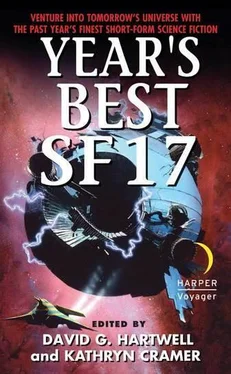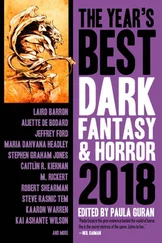Of course, we’d been ridiculously optimistic about meeting at the agreed place and time. That Saturday morning, a good hour before the ascent was scheduled, the exit from the Metro at Luxembourg was as crowded as the entrance to a football stadium on the night of a Cup Final; the Boulevard St-Michel looked as if—ha-ha—the revolution had started, or at least a rowdy manif. Cops, traffic, meeting someone: you could forget about all of those.
I did the sensible thing and found in the middle of the boulevard a bollard against which to brace myself in the throng. I switched on my earpiece, fired up my phone, and called Bob.
“Where are you?” I asked.
“Just inside the gate,” he said. “Not going anywhere.”
“I’m just outside,” I said, “and likewise. Let’s do this electronically.”
Within a few minutes I had a conference call going with Bob and the half dozen American SF writers already scattered through the crowd. Jack, of course, and Nicole, and Catherine, and Seymour and good old Milton and Ali. I tuned out their eager catch-up gossip and flicked through news channels.
Nothing much was happening at the launch site in the middle of the park—the machine was still in its crate—so they were filling in with talking heads and shots of its arrival a couple of days earlier: the wide-load truck, the police outriders, the military escort vehicles, the faces and flags lining Rue de Vaugirard; the white gloves, the flashing lights, the gleaming rifle-barrels. Some comic relief as the convoy negotiated corners and the park gate. Then the crane, straining to lift the broad flat crate and lower it to the grass. The guard of honour around the hidden machine, and the real guard among the trees, armed and wired.
I thumbed over to the phone conversation.
“— got to be a fake,” Jack was saying, in his usual confident bray. “You wait.”
“We are waiting,” said Nicole.
Laughter crackled across the phones.
“Why d’you think it’s a fake?” Bob asked, a note of anxiety in his voice.
“Anti-gravity, come on!” said Jack. “Where’s the theory?”
A babble of interruptions, shouted names of marginal physicists and outright cranks, was drowned out by a collective intake of breath, like a gust of wind in the still air. I left the phone channel open and flipped to the news. Four technicians in white coats had marched out onto the grass, towards the crate. They slid the top off—it looked like an aluminium roll-up door, which they duly rolled up—and, staggering slightly, lugged it like a log to lay it down a few metres away. Then they took up positions at the crate’s corners. With a flourish, each reached for an edge, pressed some switch, and stepped well back.
The sides of the crate fell away, to reveal a silvery lens about fifteen metres across and just over three metres high in the centre.
A huge roar went up.
“My God,” Milton said. “A goddam flying saucer.”
He didn’t sound impressed.
“If this is a stunt,” said Catherine, “they’re sure doing it very publicly.”
“You know what this reminds me of?” said Nicole. “That scene in Jefferson in Paris , you know, the Nick Nolte thing? Where he’s watching a Montgolfier ascent?”
“Too right,” said Jack. “It’s a fucking balloon! Just like at Roswell!”
The SF writers all laughed. I smiled to myself. They’d see.
Another roar erupted as the pilot walked out, helmet in the crook of his arm. He smiled around, gave a wave. The news channels were beside themselves—the test pilot was Jean-Luc Jabril, an air force veteran in his thirties, something of a mascot for the Republic because of his origins: a son of Moroccans from the banlieues who’d made good, proving his French patriotism to the hilt in the fiery skies of North Africa. Everyone around me was looking at their phones, rapt. A few metres away in the crush, a girl in a hijab had tears on her cheeks.
Ceremoniously, Jabril put on his helmet, slid the visor down, took another wave for the cameras, and ducked under the machine’s perimeter. A hatch in the underside swung open, forming a short ramp. He disappeared inside, and the hatch closed. White vapour puffed from vents on the rim.
And then, without fanfare, on the stroke of noon, the machine lifted into the air. It moved in a straight vertical, without a wobble or a yaw. The news channels’ microphones caught and amplified a faint humming sound that rose to a whine as the disc ascended. I could see it directly now, rising above the wall and the tops of the trees. I stopped watching on the screen and raised my phone to record. Everyone around me did the same.
Up and up the machine rose, faster and faster, into the clear blue sky. A thousand feet, two thousand—I wasn’t thinking in metres at this point. At three thousand feet the machine was a shining dot. I wished I’d thought to bring binoculars.
The flash was so bright that I felt sorry for those who had.
There was a sound as if half a million people had simultaneously been punched in the gut. A moment later, a sound like thunder. Then screams.
I was still blinking at purple after-images when I spotted a black dot drop from the fading flare. A parachute snapped open, perilously low. It floated downward for a few seconds and passed out of view. I’d tracked it with my camera, open-mouthed. I turned the phone over and looked at the news screen, just in time to catch a figure landing and rolling, then standing as the parachute collapsed beside him. Mobbed, Jabril had time to take his helmet off and deliver a shaky smile before the technicians and medics bundled him away.
“Jesus,” I said. Nobody heard me. I could hardly hear myself above the yells and screams and cries of relief.
It was towards the middle of that afternoon before we all met up, at a bistro in the Marais, not far from my own flat. I’d dropped by and picked up my wife, who was by now well awake and as shaken as everyone else who’d watched the ascent. We strolled around a few corners and joined the now somewhat larger group outside a bistro off Beaumarchais. They were outside because Jack had evidently insisted on smoking one of his Cuban cigars (a gesture somewhat redundant in the Year Three, but he’d acquired the taste in the old days). I bought our drinks and joined the huddle, introducing my wife to Bob and to two writers who hadn’t met her before. She smiled politely and retreated to a table with Milton and Ali, over glasses of dry white and a saucer of black olives.
“But why,” Bob was saying, “would they have their big show-off demonstration flight blow up like that? In front of everyone? If it was a fake, a balloon for fuck’s sake, they’d have done much better just bringing it back down after a shorter flight.”
“A double bluff,” Jack said. He jabbed with his cigar. “Exactly so that everyone would think the way you’re thinking.”
The discussion went around and around, not getting anywhere.
“We’ll know soon enough,” Nicole pointed out. “With all those cameras and phones pointed at it, and no doubt all kinds of instruments—hell, there’ll be a spectrograph analysis—”
“Wait a minute,” said Jack. He dropped the butt of his cigar and crushed it out on the pavement, then reached into his jacket and pulled out his phone. He thumbed the screen.
“Knew I had the app,” he said.
He poked about for a moment, then triumphantly held up his phone screen for all to see. I peered at a colour-coded histogram.
“What?” I said.
“Analysis of the light from my pics,” he said. “Hydrogen and magnesium, mostly. No wonder the flash was so fucking bright!”
The sky had clouded over, the sun had set, rain began to spit. We headed indoors. After another round, of drinks and argument, we headed out. Across the boulevard and deeper into the Marais, wandering westward. It turned into one of those evenings. Standing outside a serving hatch in the drizzle, we dined on Breton pancakes out of waxed paper, reeled across the street, occupied a bar. Got into arguments, left, got turned away from a gay club that Milton and Ali had fancied they’d get us into, found another bistro. Bob bought more rounds than he drank. He worked his way around our tables, talking to each of the writers, and eventually squeezed in beside me and my wife.
Читать дальше












